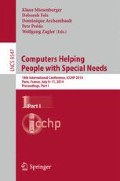Abstract
Seventeen fifth graders of elementary school in Taipei were administered a web-based AIFD learning system where they practiced aural skills in response to musical intervals, pitch identifications, and rhythms then tested on their recall of these aural skills while using adaptive immediate feedback drill as cues. The pre and post-tests resulted in a significant increase in scores from the pre-test to post-test (t (16) = 2.759, p = .014). Advanced analysis showed significant differences were observed between the pre and post-tests only for the interval recognition (t (16) = 2.634, p = .018). The result of the interviews showed that the teachers and the parents hold positive views on this AIFD learning system. They were satisfied with the progress of the students’ aural skills, participation during the class, and preference on music.
Access this chapter
Tax calculation will be finalised at checkout
Purchases are for personal use only
Preview
Unable to display preview. Download preview PDF.
References
McPherson, G.E.: From child to musician: skill development during the beginning stages of learning an instrument. Psychology of Music 33, 5–35 (2005)
Janata, P.: The neural architecture of music-evoked autobiographical memories. Cerebral Cortex 19, 2579–2594 (2009)
Koelsch, S., Jentschke, S., Sammler, D., Mietchen, D.: Untangling syntactic and sensory processing: An ERP study of music perception. Psychophysiology 44, 476–490 (2007)
Krumhansl, C.L.: Rhythm and pitch in music cognition. Psychological Bulletin 126, 159–179 (2000)
Solis, J., Ng, K.: Musical Robots and Interactive Multimodal Systems. In: Solis, J., Ng, K. (eds.) Musical Robots and Interactive Multimodal Systems. STAR, vol. 74, pp. 1–12. Springer, Heidelberg (2011)
Odam, G., Paterson, A.: Composing in the Classroom: The Creative Dream. National Association of Music Educators, High Wycombe (2000)
Smoliar, S.W., Waterworth, J.A., Kellock, P.R.: pianoFORTE: a System for Piano Education beyond Notation Literacy. In: Proceedings of ACM Multimedia 1995 Conference, pp. 457–465. ACM, New York (1995)
Clark, J.M., Paivio, A.: Dual coding theory and education. Educational Psychology Review 3(3), 149–210 (1991)
Henik, G.: Music and Self-Generated Images: Applying Dual Coding Theory, Generative Theory of Reading Comprehension, and Cognitive Load Theory to Web-Based Music Instruction. In: Proceedings of World Conference on Educational Multimedia, Hypermedia and Telecommunications, pp. 1129–1136 (2003)
Author information
Authors and Affiliations
Editor information
Editors and Affiliations
Rights and permissions
Copyright information
© 2014 Springer International Publishing Switzerland
About this paper
Cite this paper
Huang, Y.T., Chu, C.N. (2014). Making Music Meaningful with Adaptive Immediate Feedback Drill for Teaching Children with Cognitive Impairment: A Dual Coding Strategy to Aural Skills. In: Miesenberger, K., Fels, D., Archambault, D., Peňáz, P., Zagler, W. (eds) Computers Helping People with Special Needs. ICCHP 2014. Lecture Notes in Computer Science, vol 8547. Springer, Cham. https://doi.org/10.1007/978-3-319-08596-8_72
Download citation
DOI: https://doi.org/10.1007/978-3-319-08596-8_72
Publisher Name: Springer, Cham
Print ISBN: 978-3-319-08595-1
Online ISBN: 978-3-319-08596-8
eBook Packages: Computer ScienceComputer Science (R0)

